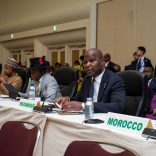Mozambique: Freezing of exchange rate contributes to foreign currency shortage
Mozambique: Growth forecast of 1.6% does not consider insurgency in north

File photo: Lusa
The International Monetary Fund (IMF) representative in Mozambique said on Friday that the reduction of the growth forecast to 1.6% this year does not take into account the effects of attacks in the north of the country.
“The result in 2020 was a little worse than what we projected, we anticipated a contraction of 0.5%, but it turned out to be 1.3% because of lower coal and aluminium exports due to temporary reforms at the Moatize mine, and cooled global demand, which was a reflection of the pandemic,” Alexis Meyer-Cirkel said.
During a presentation on the Fund’s latest report for sub-Saharan Africa and focusing on Mozambique, the IMF leader in the country said that “the forecast for GDP growth in 2021 has been cut from 2.1% to 1.6%. However, this forecast does not yet incorporate the effects of the March attacks in Palma,” which means that it could be revised downwards due to developments in the situation, which has worsened the risks.
“Although uncertainties have increased due to the insurgency in the north, there are also positive influences, such as the marked recovery of large countries like the United States and the increase in coal production capacity by Vale,” Alexis Meyer-Cirkel added.
In his speech, the IMF resident representative in Mozambique, since the end of last year, noted that “Mozambique has dominated the second wave” of the pandemic, but warned that “the trajectory is uncertain and it seems clear that the region is not out of the woods.
The uncertainty about the evolution of the pandemic, in fact, led the IMF to predict that GDP per capita would only return to pre-pandemic levels at the end of 2023, “but the negative scenario, which incorporates delays in vaccine distribution in the sub-Saharan African region, would delay the return to pre-pandemic levels until the end of 2024.
In the case of Mozambique, he stressed, “the trajectory is more beneficial, but does not yet incorporate the effects of the insurgency” in the north of the country.
Reviewing the country’s main indicators, the IMF representative in Mozambique noted that whilst in sub-Saharan Africa, the average number of days that children did not go to school due to the pandemic was 67, in Mozambique, it was close to 100 and said that classes at weekends and using technology did not compensate for the lack of classroom lessons.
Armed groups have terrorised Cabo Delgado since 2017, with some attacks claimed by the ‘jihadist’ group Islamic State, in a wave of violence that has led to more than 2,500 deaths according to the ACLED conflict registration project and 714,000 displaced according to the Mozambican government.
An attack on Palma, near the gas project under construction, on 24 March caused dozens of deaths and injuries, with no official balance announced.
The Mozambican authorities said they had taken back the town, but the attack led oil company Total to abandon the site of the project, which was scheduled to start production in 2024 and on which many of Mozambique’s economic growth expectations for the next decade are anchored.
According to the latest official data, Africa recorded 301 more Covid-19-associated deaths between Wednesday and Thursday, for a total of 125,404 deaths since the pandemic began and 8,746 new cases.













Leave a Reply
Be the First to Comment!
You must be logged in to post a comment.
You must be logged in to post a comment.